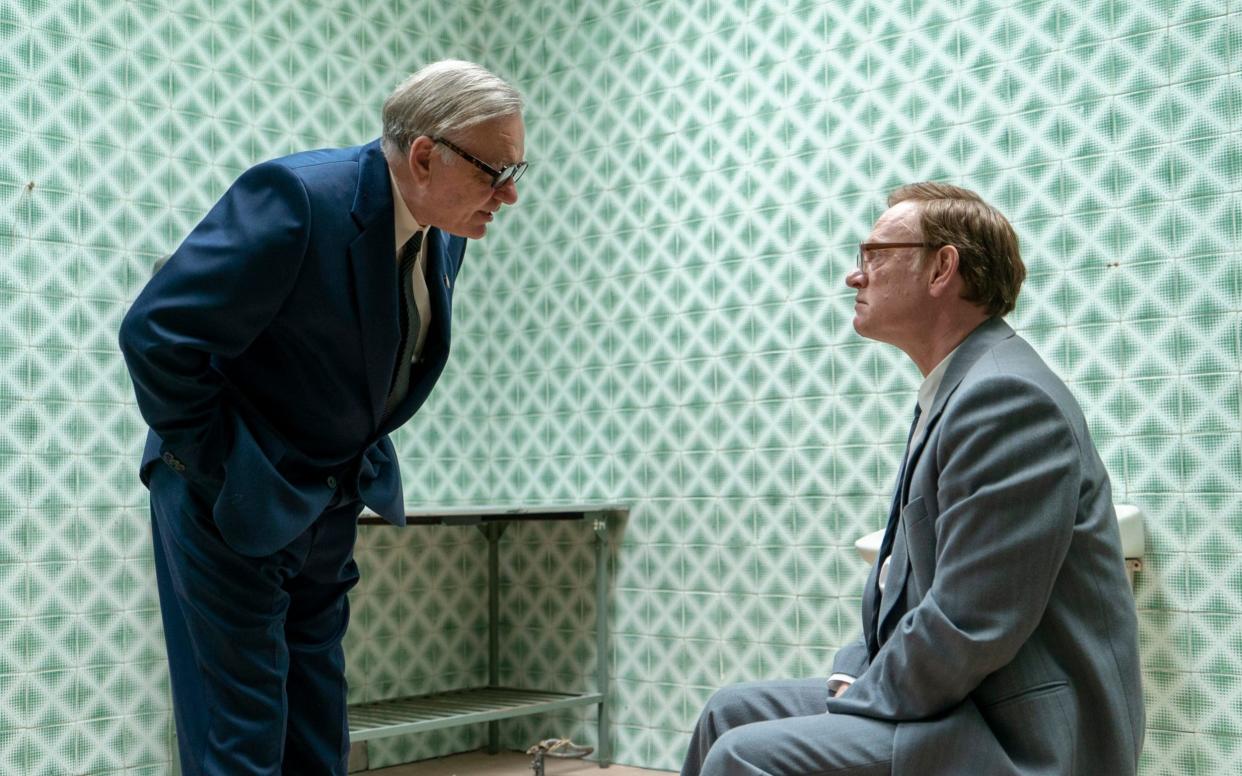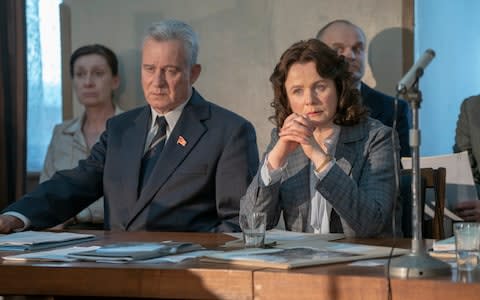Chernobyl, final episode review: one of the finest TV dramas ever made

After the trauma, the reckoning. In this golden age of TV, series creators tend to make grandiloquent claims about making very long movies, as if admitting to making “television” showed a lack of ambition. Chernobyl (Sky Atlantic), though, has very deliberately used the episodic nature of the miniseries format to filter all the different facets of the event through a variety of genres: disaster movie of course, but also body horror, love story, political thriller, espionage suspenser, action adventure and even pitch-black comedy, the tension throbbing away at high intensity throughout.
It ended, however, as a courtroom drama, with flashbacks explaining exactly what had happened and why. After all the nightmarish details and awestruck accounts of individual and collective bravery, this was about the nuts, the bolts and the blame.
The plant’s fall guys Dyatlov (Paul Ritter), Bryukhanov (Con O'Neill) and Fomin (Adrian Rawlins) stood accused of causing the whole farrago. Among those bearing witness were our three flawed heroes, Valery Legasov (Jared Harris), Boris Shcherbina (Stellan Skarsgård) and Ulana Khomyuk (Emily Watson).
While their evidence implicated those that were on trial, acknowledging operator error as the Kremlin had intended, Legasov finally, haltingly and – as we knew from the opening scene of the whole series – at tremendous personal cost, came to point the finger at the Soviet state itself.
From the outset, the Kremlin and those operating under its orders had prized preserving their fatally inaccurate version of the truth over making their remaining reactors safe or saving lives. Legasov spelled out a particularly damaging example, noting how the plant’s failsafe switch had been compromised by state thriftiness: cheaper graphite tips had been used on the boron control rods so that, rather than shutting down the radioactive process, they acted as a detonator. It was a triumphant example of the cast’s mastery of delivering exposition (on nuclear physics!) in a manner that both made sense and held the attention.

While the three on trial behaved abominably – Dyaltov in particular, was a bully unforgivably out of his depth – they were unarguably products of the system. In their desperation not to lose face or be seen to be failing, they had denied plain facts and pushed inexperienced juniors to take unthinkable risks in completing a safety test that would keep the powers-that-be happy.
With their lives irreparably shortened and cancer spreading, neither Legasov and Shcherbina had anything to lose. What could have been anticlimactic in dramatic terms in fact proved enormously satisfying and every bit as provocative and anger-inducing as the previous four hours. "Every lie we tell incurs a debt to the truth,” concluded Legasov. “Sooner or later, that debt is paid.” It was, after so much subterfuge and dishonesty, a release of sorts, tempered by its unarguable relevance in the era of Trump, the rejection of experts and so-called “fake news”.
The climax spelled out the fates of most of the protagonists. Many, inevitably, had met premature ends, although there were uplifting codas: the first of the three divers whose courage prevented the effective destruction of a continent died only recently; Lyudmilla Ignatenko (the Pripyat firefighter’s wife played beautifully by Jessie Buckley) defied medical experts to have a child. And Legasov? His suicide created a momentum even the Soviet state could no longer resist, forcing it to retrofit the remaining nuclear reactors and make a repeat of Chernobyl considerably less likely.
The series as a whole has been a towering achievement richly deserving its place as IMDb’s top-rated TV show; it’s rare that a series has met with both near-universal critical acclaim and popularity with viewers. But then, everyone involved is operating at something close to the peak of their powers. The cast, of course, but also the crew. Director Johan Renck (whose CV includes The Last Panthers and David Bowie’s Lazarus and Blackstar videos), created tableaux that will linger long in the memory: the gradual covering of graves with concrete or the nuclear dust drifting onto Pripyat’s uncomprehending citizens like snow. There was beauty, even in the horror.
Credit, too, to make-up and prosthetics designer Daniel Parker, whose diligent documentation of the effects of radiation sickness made certain sequences authentically and almost unwatchably appalling. The research and acquisitions of the production designers and costumes team made the series one of the most accurate recreations of the late-Soviet era yet seen, garnering praise from Russians who lived through the era.
And above all Craig Mazin, who could stake a claim to be the most versatile screenwriter working today: his previous work included sequels for the Scary Movie and The Hangover franchises. His dedication to historical accuracy was both admirable and logical – after all, with events this dramatic and far-fetched, why exaggerate?
He dedicated his series to the memory “of all who suffered and sacrificed”. It depicted that suffering, sacrifice and much else besides with honour, insight and profound humanity.

 Yahoo Movies
Yahoo Movies 
